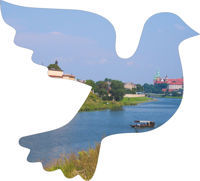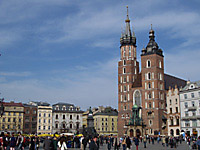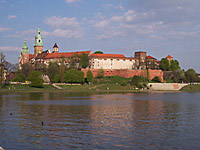|

The second largest city of Poland and the country's ancient
capital is sometimes spelled as Cracow in English although
its correct English name is Krakow nowadays.
Cracow in short.
Cracow (Krakow) is the top tourist destination of Poland.
The city basks in glory of its long history and it greatly
treasures its reputation of the culture capital of
Poland.
Cracow's seven universities plus almost twenty other
institutions of higher education make it the country’s
leading center of science and education. The city's
expanding service sector is the lifeblood of local economy
but varied industry and production still provide substantial
proportions of jobs and wealth.
Cracow is the metropolis of southern Poland and the capital
city of the Malopolska Province (Wojewodztwo Malopolskie).
Population of Cracow.
The city has about 755,000
permanent residents and the Cracow conurbation totals some
1.5 million people. The cosmopolitan atmosphere of the city
center may be somewhat misleading. Despite recent growth in
the number of immigrants and expatriates, inhabitants of
Cracow remain ethnically almost homogeneous and they proudly
declare their Polish nationality.

Geography of Cracow, Poland.
Geographic coordinates of
downtown Cracow are 50°04'N 19°56'E. The city lies in
southern Poland on the banks of Wisla (Vistula) river.
Cracow has area of 326.8
square kilometers which amounts to 0.1 percent of the
territory of Poland.
The average elevation of
Cracow is about 220 meters above sea level. There are
several hills in the city of which highest, Sowiniec, rises
384 meters above sea level.
History of Cracow.
The oldest artifacts
excavated in Cracow date from the Paleolithic period (early
Stone Age), some 200,000 years ago. Archeologists have
established that the area was a regional center from the
Neolithic period 6,000 BC. Cracow was already a thriving
city circa 990 when the early rulers of Poland incorporated
it into their newly created state. In 1038 Cracow gained the
status of the capital of Poland. In 1257 Prince Boleslav the
Shy gave the city self-government and key commercial
privileges. Officially Cracow retained the title of Poland's
capital to the end of the 18th century yet the political
center had been transferred to Warsaw in 1611. From 1815
until 1846 Cracow with its environs enjoyed short-lived
independence of sorts as a quasi-sovereign statelet called
Cracow Republic to be annexed soon to the Austrian Empire.
At the outset of the 20th century Cracow became the hub of
the Polish national awakening and in 1918 it was the first
Polish city to abolish the foreign rule.

Cracow versus Krakow
The original spelling of the
Polish name of the city is Kraków, pronounced ‘krakoof’. The
slightly anglicized version 'Krakow' has been universally
adopted in modern English since the middle of the 20th
century. It replaced the older, now outdated spelling Cracow
which was derived from the city's Latin name 'Cracovia'
or possibly from the French 'Cracovie'. Nevertheless
some native speakers prefer to use the written form Cracow
for some reason whereas nonnative English speakers,
including Krakow-born ones, often learn the old spelling
from obsolete textbooks.
Calendar of concerts and other events in Cracow.
|
Travel to Cracow
By plane, by bus, by train, by
car.
Best hotels in Cracow
Hostels in Cracow and other low-cost accommodation
Rental holiday apartments in Cracow
Where to eat out in Cracow
Shopping in Cracow
Cracow
tours and day-trips
Touring
the city and the Malopolska region.
Real
estate in Cracow
|





